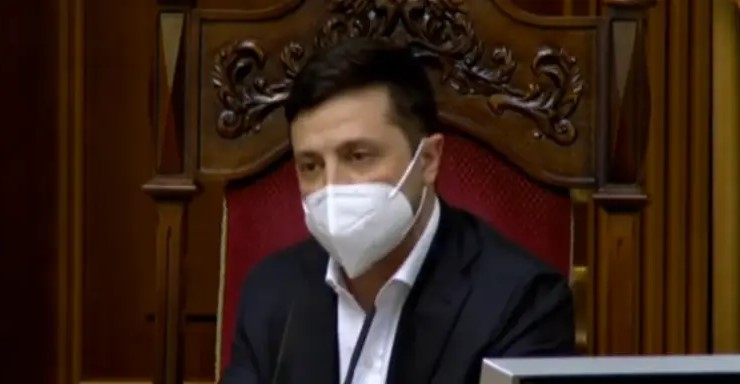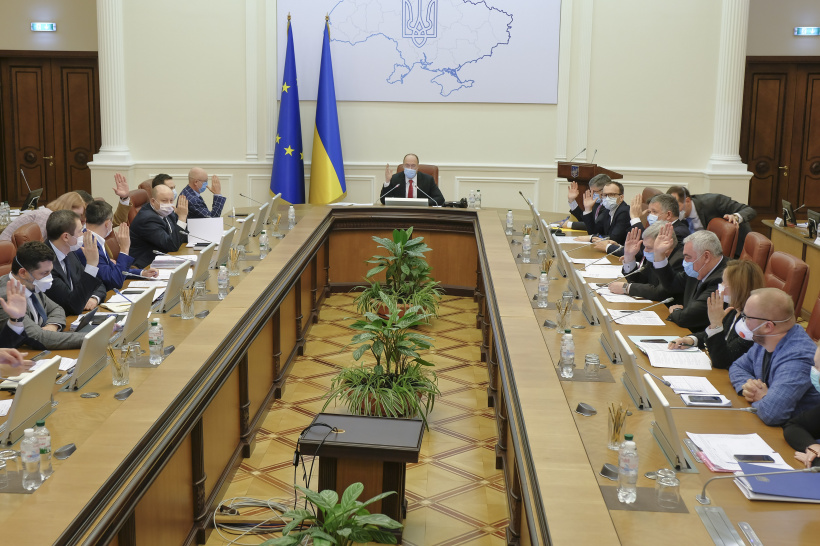The measures have raised controversy and complaints are rampant. Why is the government’s sole reliance on preventive measures? Why are they ignoring the failings of the healthcare system to combat COVID-19?
Moreover, are these harsh measures — introduced summarily — legal at all?
Read more: Obligatory masks and no strolls in parks: Ukraine introduces stricter COVID-19 crackdown measures
Imposing these restrictions has only served to raise fears among the public — and not only of the pandemic. The experience of living under a government that has consistently tried to usurp power is only too familiar. It is not difficult to see the parallel between these curtailments and those imposed during the 2014 Euromaidan Revolution, when the former Parliament tried to prevent large gatherings by adopting dictatorial laws.
The level of trust towards law enforcement has not increased, six years after the revolution. Several cases of unlawful persecution of activists are still simmering before the courts, and this latest government directive is just another log on the fire. Obvious to anyone is that measures exacted against wary citizens, involving the police or the National Guard — agencies now subordinated to the Ministry of Internal Affairs — will face resistance.
When the government acts chaotically, confusing people and raising hackles, there is bound to be pushback. Announcing border closures has resulted in lengthy queues at checkpoints. Allowing only those with a special permit to use public transport has led to endless queues to get one.
On the question of coronavirus infection, people with symptoms are being denied testing and directed to just stay home. Even worse, the government has allowed infected people to go to shops and pharmacies in case of emergencies. People are obliged to wear medical masks, but the masks and other protective gear are out of stock at pharmacies. The government has now officially allowed the use of homemade masks - which offer no real protection, and are not the same as medical masks.
In effect, those in power are dictating recklessly and putting people at even greater risk.
What is not allowed now?
The new restrictions, Resolution 255, were introduced by Cabinet on 2 April, with most coming into force on 6 April. They include:
- prohibiting being outside without wearing a mask or a respirator
- prohibiting visiting parks, forests, rivers, beaches or any other recreational areas
- prohibiting gathering in a group of more than two people
- requiring all citizens to carry ID
- demanding people over 60 to completely self-isolate, with the exception only of those who live alone and have no one to rely on for groceries and other essentials
Additional rules have been established for children younger than 14, for families with children, and for those people who have pets. Violation of quarantine rules can carry a fine from UAH 17,000 (about $627) up to UAH 34,000 (about $1,254).
The legal discussions
The new measures have spawned disputes over the manner in which they were introduced. Opinions vary from completely justifying the action to labeling it a coup d'état. Among those supporting the coup d'état version is lawyer Henadiy Druzenko. He proclaimed the government-imposed restrictions as violating the Constitution of Ukraine - at least in terms of rights and freedoms. He stated there are only two exceptions in the Constitution that can be used to suspend the fundamental rights and freedoms of all citizens: declaring a state of emergency, and enforcing martial law. He also listed the constitutional articles that cannot restrict rights and freedoms under any circumstances.
Druzenko went so far as to say that 6 April was the day a state coup actually occurred in the country — as predicted,
“I am not against the quarantine measures. I am in every way for them. However, when these measures are introduced in an overtly unconstitutional way, I am strongly against them. Relative freedom is all that remains in this country. If we exchange it for a slight chance to survive the pandemic conditions, it may never return to these terrains.”
Mykola Havroniuk
, an expert with the Center for Political and Legal Reforms, explains that any government’s decree is essentially a bylaw. As such, it must be based on corollary provisions of the law and align with them - without exception. Havroniuk goes on to say that Resolution 255 should flow from the provisions of at least three specialized laws:
- Law of Ukraine "On the Protection of People from Infectious Diseases"
- Law of Ukraine "On Ensuring the Sanitary and Epidemic Well-Being of the Population"
- Basics of the Legislation of Ukraine on Health Care
Instead, the resolution abides only by the first of these. Both the law and the resolution should follow the Constitution, which states that the rights and freedoms cannot be restricted, except in the specific cases as foreseen by the Constitution.
Havroniuk lists some of the constitutional rights and freedoms which have been violated:
- respect to dignity, simultaneously allowing things which are humiliating
- freedom of movement and the non-interference in personal and family life
- freedom to partake collectively in religious observances and rituals
- right to assemble peacefully, without arms, and to hold meetings, rallies, marches, and demonstrations
- right for business activities not prohibited by law
He points out that the government had the opportunity to impose a state of emergency according to existing laws, and to legally introduce restrictions of some rights. In not doing so, one might conclude that impunity was, in effect, the goal.
Oleksandr Burmahin, executive director of the Human Rights Platform, believes
that in the current situation, restrictions of human rights and freedoms are legal and justified.
He stresses that the Constitution contains provisions that oblige the state to protect a person’s life, and to restrict applicable rights for the protection of the overall population’s health. He adds that many decisions of the European Court on Human Rights refer to this very obligation.
On the other hand, Havroniuk says the main question is whether the corollary laws supersede constitutional rights. Burmahinar agrees that additional restrictions are needed within the current legislation. However, he believes that human rights are guaranteed at the international level, and can only be deviated from in extreme cases, as foreseen by Article 15 of the European Convention for the Protection of Human Rights and Fundamental Freedoms (ECHR).
Burmahin notes that some countries, including Latvia, Romania, Moldova, Armenia, Estonia, and Georgia have already informed the Secretary General of the Council of Europe of their need to relax their commitments in terms of the European Convention on Human Rights, and of the measures they have had to take to combat the spread of COVID-19.
The sense of the provisions themselves
On 7 April, the Kharkiv Human Rights Protection Group (KHPG) published its conclusions regarding the new quarantine measures arising from Resolution 255. The KHPG does consider the restrictions, with some exceptions, appropriate.
A key exception they have identified is prohibiting people older than 60 to leave their homes. As of October 2019, some 2.5 mn retirees still worked. The new prohibition would cause them to lose their jobs. KHRP suggests relaxing the demand for self-isolation, so that these individuals can still work, as well as partake in recreational activities.
Prohibiting people from enjoying fresh air can lead to weakened immunity, provoking cardiovascular, autoimmune and other diseases. Such a measure contravenes the World Health Organization, as well as Ukraine’s Ministry of Health, as well as recommendations on preventive measures to combat COVID-19.
KHRPG does not support the prohibition of strolling in parks, recreational areas, forests, coastal areas, and others, since they are intended exactly for this purpose, and provide the best lung ventilation. Further, they consider it inappropriate to demand people carry ID at all times, and recommend its cancelation,
“It seems that it was introduced solely for the convenience of law enforcement, so that they can easily identify, for example, a person over 60 or not. But such practices presuppose that all residents of the country are delinquent and turn the country into a police state.”
The KHPG also considers the actual means of implementing the new measures as unconstitutional. The provisions of corresponding legislation already establish wide discretion for executive authorities, in particular, for the Cabinet. This legislation provides the option of exercising needed measures, and to do so according to the Constitution, which assigns that power exclusively to the single legislative body of Ukraine - Parliament.
Read also:
- COVID-19 death toll hits 52 in Ukraine, cases surpass 1,600 amid tightened quarantine restrictions
- Interactive COVID-19: Ukraine and world
- Obligatory masks and no strolls in parks: Ukraine introduces stricter COVID-19 crackdown measures
- Disinformation that can kill: coronavirus-related narratives of Kremlin propaganda
- Russian propaganda spreads conspiracy that coronavirus could be designed to kill elderly Italians
- No coronavirus testing in Russia-occupied territories of Ukraine: extent of epidemic unknown
- Coronavirus is not a biological weapon. It’s an information one
- The pro-Russian network behind coronavirus riots in a small Ukrainian town
- Breaking: Ukraine sees first coronavirus death, closes entry for foreigners, suspends international air travel





